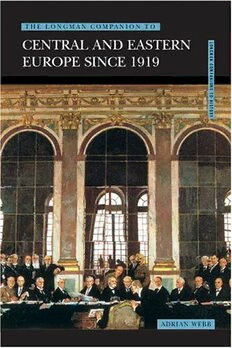
Longman Companion to Central and Eastern Europe since 1919 PDF
345 Pages·2002·2.411 MB·English
Most books are stored in the elastic cloud where traffic is expensive. For this reason, we have a limit on daily download.
Preview Longman Companion to Central and Eastern Europe since 1919
Description:
Huge coverage including: Albania, Bosnia, Bulgaria, Croatia, Czechoslovakia and its successor states, Hungary, Macedonia, Montenegro, Poland, Romania, Serbia, Slovenia and Yugoslavia and its successor states. East Germany and Austria are included where they are an essential part of the story or form an interesting comparison. Discussion of economic, environmental, human and cultural issues in addition to political focus. Designed for quick and easy reference.The countries of Central and Eastern Europe have had their political, economic and geographical boundaries drawn and re-drawn at key moments throughout the twentieth century. This topical new guide to the region gives a comprehensive picture of the major historical developments since the signing of the Treaty of Versailles, and charts the transformations and upheavals of recent years. It pays particular attention to the early nationalist and then fascist, communist and new nationalist periods, highlighting similarities and differences within Fascist Italy, Nazi Germany, and including Austria and Germany where relevant to the story.Essential reading for anyone needing to understand the complex and turbulent history of the region, the volume offers key facts and figures supported by commentaries, chronologies, and biographical essays, and includes a glossary of terms and a full bibliography. Adrian Webb teaches European history at the Southampton Institute and is a regular contributor to the European Policy Analyst published by the Economist Intelligence Unit. He is the author of the Longman Companion to Germany since 1945.
See more
The list of books you might like
Most books are stored in the elastic cloud where traffic is expensive. For this reason, we have a limit on daily download.
